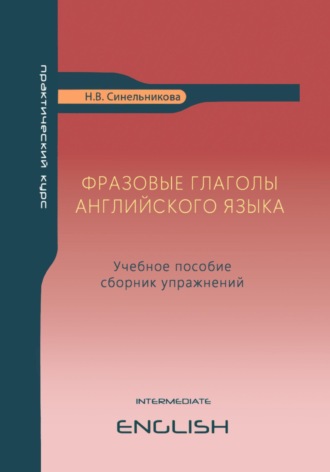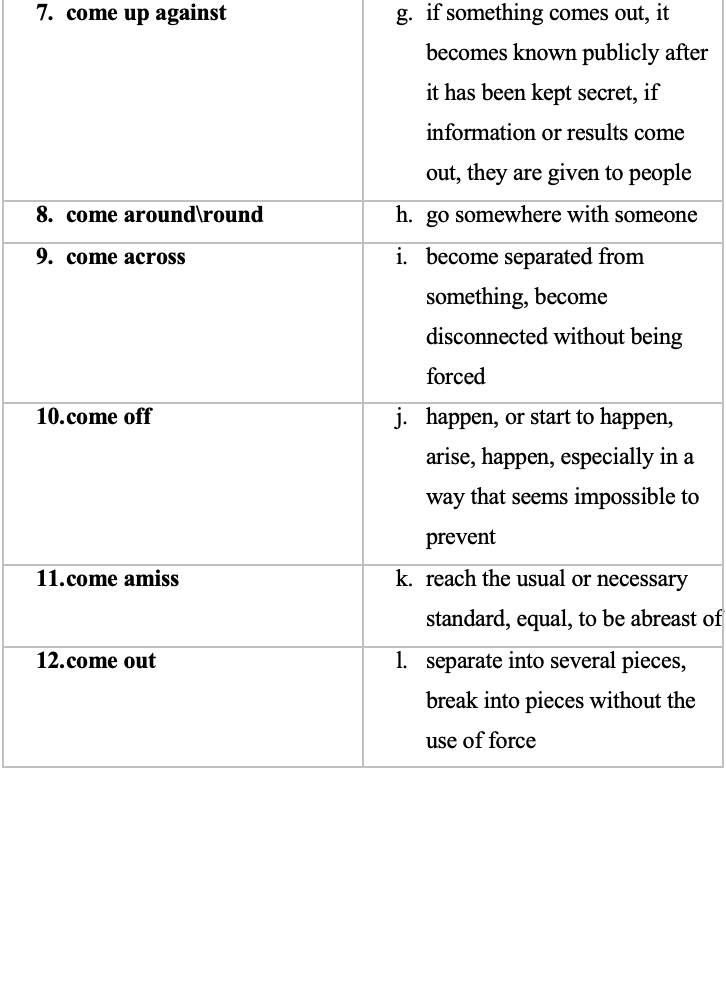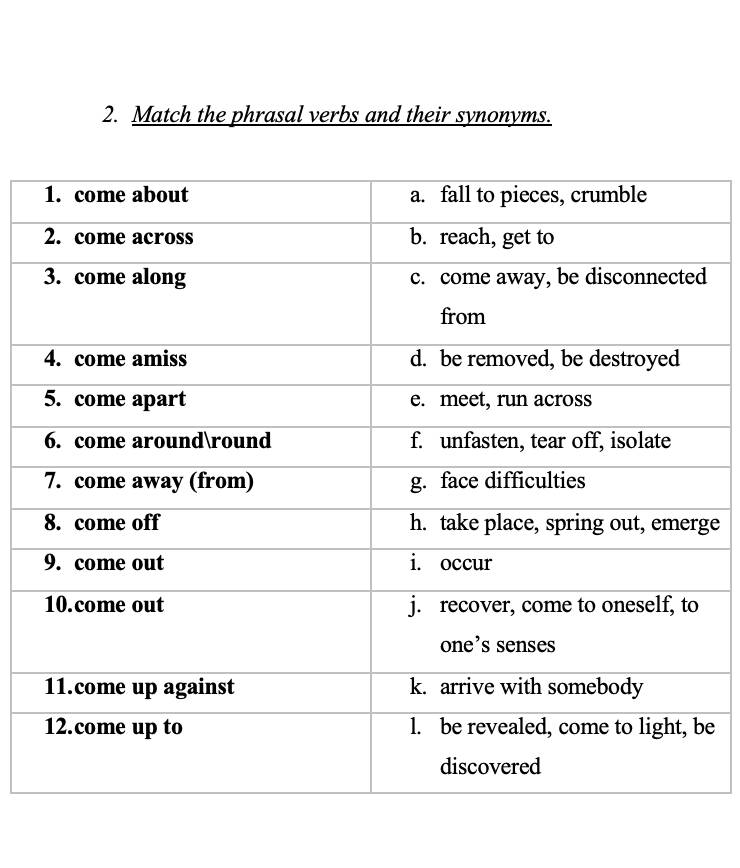
Полная версия
Фразовые глаголы английского языка
channel into – to direct something into a particular place or situation
–направлять что-либо куда-либо
chop down – to cut through something to make it fall down
– срубать что-либо, разрушать, уничтожать, подавлять
chuck away on – to waste one’s life or strength on somebody, to throw something carelessly
– растрачивать жизнь, силы на кого-либо впустую, ронять себя недостойным образом, тратить деньги на ветер, упускать возможность, выкинуть, выбросить
chuck together – to build or to write in a hurry, to make something in a hurry, anyhow, in a slipshod way
– строить или писать что-либо торопливо, делать что-либо наспех
clash against – not to harmonize, not to tone with, not to match, not to be right for
– не гармонировать с чем-либо, не подходить к чему-либо, не соглашаться
clear away/up – to disappear, disperse; dissipate, to make a place tidy by removing things from it or putting them where they should be
– исчезать, рассеивать (сомнения), убирать, устранять, удалять
cling onto – to try very hard to keep something, to stick onto or hold something or someone tightly, or to refuse to stop holding them
– цепляться, держаться за кого-либо или что-либо, прижиматься к кому-либо или чему-либо, пытаться удержать что-либо, цепляться за что-либо
close down – if a business or organization closes down or someone closes it down, it stops operating, to cause to stop operating or providing services, especially without the intention of starting again, to stop broadcasting at the end of the day (of a radio or television station)
– закрывать(ся), прекращать деятельность, (о магазине, фабрике), прекращать вещание на ночь (о радио или телестанции); ликвидировать (предприятие)
coat with – to cover something with a layer of a particular substance
– покрывать что-либо слоем чего-либо, обрастать чем-либо
collaborate with – to work with someone else for a special purpose, to cooperate
– сотрудничать с кем-либо, быть партнерами
collide with – to crash violently, to come into disagreement, to be opposed
– сталкиваться с чем-либо, с чем-либо, вступать в противоречия с чем-либо, не соглашаться
comb for – to search a place or an area very carefully in order to find something
– прочесывать местность и т.п. в поисках чего-либо или кого-либо
combine with – to join together, to form a single unit or whole, to unite, to work with someone else in order to achieve something which you both want
– соединяться с чем-либо, объединяться, присоединять что-либо к чему-либо



3. Fill in the gaps with the appropriate particles.
onto, in, up with, away, with, down, for, with, together, with, against, away, down, with
1. This abstract looks as if it has just been chucked __.
2. I have been collaborating __ him on this project for more than two years already.
3. Clifford has combed the yard __ your hairpin but it is not here.
4. When he learnt that Julia had accepted his terms his doubts cleared__.
5. The city was chopped __ by the invaders.
6. I wouldn't like my attitude to the plan to collide __ yours.
7. As inflation is rising many factories have to be closed __
8. If you can combine willingness __ hard work, you will be promoted.
9. If you cling __old things you will never feel the charm of novelty.
10. I have decided to renovate my flat and want to have the floor coated __ lacquer.
11. Japanese companies focus more on cost reduction, rather than cashing__.
12. Trainers clash __ an evening dress, don't they?
13. Dan denied chucking the whole weekend __ on computer games.
14. Garrard never doubted that Bill would catch __ modern trends.
4. Translate into English.
1. Разве кроссовки можно надевать с вечерним платьем?
2. Многие предприятия будут закрыты из-за роста инфляции.
3. Создается такое впечатление, что эта аннотация написана наспех.
4. Я не хочу, чтобы у нас были разногласия по поводу этого плана.
5. Если ты хочешь и можешь упорно работать, тебя повысят.
6. Гаррард никогда не сомневался в том, что Билу удастся уловить современные тенденции.
7. Дэн не хотел признаваться в том, что все выходные он провел за компьютерными играми.
8. Я работаю вместе с ним над этим проектом уже более двух лет.
9. Клиффорд перерыл весь двор в поисках твоей заколки, но не нашел ее.
10. Когда он узнал, что Джулия приняла его условия, его сомнения рассеялись.
11. Японские компании пытаются добиться снижения цен на свою продукцию вместо того, чтобы извлекать выгоду.
12. Я затеял ремонт и хочу покрыть полы лаком.
13. Если ты цепляешься за старое, ты никогда не поймешь прелести нового.
14. Боевики стерли город с лица земли.
5. Make up sentences of your own using the phrasal verbs of Unit 6.
6. Make up a vocabulary story using the phrasal verbs of Unit 6.
7. Choose the best verb.
1. The engineers (catered for, channeled off, chopped down) the rising water of the river to avoid flooding.
2. My opinions (clash against, cling onto, coat with) yours.
3. The members decided to (combine, cash, chuck) the tennis club (with, in, away on) the dancing school, forming one sports club.
4. The steps were (chucked together, coated with, clashed against) ice.
5. The chairman’s opinion (channeled off, closed down, collided with) that of the rest of the committee.
6. Your advice is (chucked away, cleared away, collaborated with) on that boy.
7. The police are (combining, chopping, combing) the woods (for, down, with) the missing man.
8. The child (caught up with, catered for, clung onto) his mother.
9. The sportsmen will (catch up with, cash in, collide with) you in the end.
10. I’ll just (channel, chuck, comb) a few things (off, together, for) and set off straight away.
11. Weddings are (catered for, cashed in, cleared away) in our cafe.
12. People who (caught up with, clashed against, collaborated with) the enemy during the war were punished afterwards.
13. The owner has to (clear, close, coat) the shop (away, down, with) his shop.
14. The committee members (chopped down, collaborated with, chucked away on) the chairman’s opinion.
15. In the afternoon the clouds (channeled off, cleared away, collided with) and the rest of the day was fine.
16. You can (cling onto, combine with, cash in) the shares at the end of five years.
8. Replace the italicized words by a phrasal verb from Unit 6. Make necessary changes.
1. All his efforts were wasted.
2. The roof was covered with tiles.
3. The record company provides for all tastes in music.
4. The plane crashed into a mountainside.
5. The chemical mixes with air to form a liquid.
6. That green hat doesn't go with the blue dress.
7. Platt was twice hacked down in the second half by the other team's sweeper.
8. If there is a branch near you, hold onto it until we can get a rope.
9. Can I exchange this cheque for dollars?
10. I would like you to cooperate with me on the writing of my next book.
11. A certain amount of the firm’s money was spent on training purposes.
12. They sought the bushes for evidence, but in vain.
13. Too many young people hurry into marriage without considering the responsibilities.
14. Please, take your papers off the table so that I can serve dinner.
15. All the mines in this area stopped working in the 80's.
16. We shall have to work hard to be abreast of the other firm.
9. Translate into English using the phrasal verbs of Unit 6.
1. Сэм поспешно ответил, боясь что Дебора передумает и уедет без него.
2. Раздался скрежет металла, когда машина столкнулась с деревом.
3. Грэйс пыталась переключить внимание Блэйка на более осуществимые цели.
4. Виктор продолжал настаивать на своем плане, несмотря на то, что директор засыпал его вопросами.
5. Воспользовавшись отсутствием матери, Бобби провел весь день за компьютером.
6. Если ты хочешь совмещать приятное с полезным, преврати свое хобби в работу.
7. Его слова всегда идут вразрез с его действиями.
8. Шон понимал, что вот-вот поссорится со своим бывшим партнером по бизнесу, если не возьмет себя в руки.
9. Надо бы покрасить дверь сарая, а то она совсем потрескалась.
10. Только что приехавший моряк прошел по все каютам в поисках капитана.
11. Сначала родители не хотели поощрять интерес сына к компьютерам, но потом они подумали, что, это возможно, его призвание.
12. Какой смысл гнаться за модой, если она постоянно меняется?
13. Тоби только усугубил ситуацию, выдавив из себя улыбку.
14. М-р Твит был вне себя, когда узнал, что предприятие закрывают, не посоветовавшись с ним.
15. Мы начали сотрудничать с компанией Иль Де Ботэ год назад и уже смогли выйти на рынок с новыми ароматами.
16. Пока он вел разгульную жизнь, деньги как-то незаметно иссякли.
17. Я устал угождать тебе в каждой мелочи! Ты все равно не ценишь это.
10. Give antonyms to the phrasal verbs of Unit 6. Ask your classmates to guess which phrasal verb they correspond to.
11. Work in pairs. Make up 3-5 short dialogues using the phrasal verb of Unit 6. Act them out.
12. Work in turns. Use the phrasal verbs of Unit 6 to make up your own statements or questions stimulating further talk and ask your classmates to respond to them on the spot.
Unit 7
Study the definitions of the phrasal verbs given below.
come about – start to happen, to arise, to happen, especially in a way that seems impossible to prevent; to appear
– появляться (об идее, проблеме), возникать, происходить,
– случаться
come across – to meet, to find or discover, especially by chance
– случайно найти что-либо или встретить кого-либо, натолкнуться на что-либо или кого-либо
come along – to go somewhere with someone; to appear at a place; to develop or improve
– приходить, приезжать вместе с кем-либо, сопровождать кого-либо; делать успехи, продвигаться (о делах, работе, здоровье)
come/go amiss – to happen unexpectedly; if something would not come amiss, it would be useful and might help to improve a situation
– непредвиденно, не вовремя, некстати случаться (о событии), не получаться, выйти из строя, заболеть
come apart – to break into pieces without the use of force
– разваливаться, рассыпаться на куски, части, ломаться
come around\round– to become conscious again after an accident or operation, regain consciousness; to visit someone in their home; to change your mind
– приходить в себя (после болезни, обморока), улучшаться; заходить, заезжать; менять мнение, соглашаться с кем-либо/чем-либо (to sb/sth)
come away (from)– to become separated from something, to become disconnected without being forced
– отламываться, отходить, отскакивать
come off – to become unfastened or disconnected from; to stop using, to finish something successfully
– отрываться, падать, отсоединяться от чего-либо, отходить от чего-либо; перестать делать что-либо; удаваться с успехом
come out(of) – if dirt or a mark comes out, it disappears from something when it is cleaned; be removed, especially by washing
– выводиться, сходить, исчезать
– if something comes out, it becomes known publicly after it has been kept secret; if information or results come out, they are given to people
– обнаруживаться, становиться ясным или известным
– if you describe how something or someone comes out at the end of a process or activity, you say what condition they are in or what they have achieved
– выходить, получаться, складываться
come up against – to have to deal with a problem, to meet a difficulty or opposition, encounter
– конфликтовать, столкнуться с трудностями, сопротивлением, натолкнуться на трудности, встречаться (с проблемами)
come up (to) – to reach the usual or necessary standard, to equal, to be abreast of
– достигать чего-либо, доходить до чего-либо, сравняться с чем-либо, приближаться к чему-либо, соответствовать чему-либо, вырасти в чьем-либо мнении
come up with – to suggest or think of a plan or an idea
– предлагать план, идею, проект и т.п.



3. Fill in the gaps with the appropriate particles.
amiss, round, out, about, up to, apart, away, out across, up against, along, off
1. The book was so old that it just came __ in my hands.
2. I can't find the button, it must have came __when I was on the way home.
3. When he took charge of the office he came __ his staff's unwillingness to follow his instructions.
4. David hesitated for a moment before he answered. "O.K. Come __ ", he whispered.
5. Business must be good but what will come __of it?
6. To our surprise he managed to give an accurate idea of how it all had come __.
7. It has come __ that the interim government comes __ huge challenges.
8. Alec told the seamen to throw some water on the boy to help him come __ after a painful punch into his chin.
9. A button has come __ my keyboard. How can I fix it?
10. I hope nothing comes __ when we put in a special camera to watch the subterranean world of the nesting puffin.
11. During the flood the water came __ the roofs.
12. Barbara came __ this business card while leafing through the books.
4. Translate into English.
1. Дэйвид помедлил с ответом, затем прошептал: " Ладно, пойдем туда вместе."
2. К нашему удивлению он смог очень точно объяснить как все произошло.
3. Барбара наткнулась на эту визитку, когда пролистывала книги.
4. На моей клавиатуре отвалилась кнопка. Как мне ее прикрепить?
5. Я не могу найти пуговицу, наверное она оторвалась когда я ехала домой.
6. Алек велел морякам побрызгать юношу водой, чтобы он пришел в себя после удара кулаком в подбородок.
7. Во время наводнения вода доходила до крыш домов.
8. Должно быть дела идут хорошо, но что будет дальше?
9. Когда он взял на себя руководство отделом, он столкнулся с нежеланием подчиненных выполнять его предписания.
10. Я надеюсь, что не произойдет ничего непредвиденного, когда мы установим камеру, разработанную специально для наблюдения за подземной жизнью топорика (puffin).
11. Выяснилось, что временное правительство столкнулось с трудно разрешимыми проблемами.
12. Книга была такая старая, что просто рассыпалась у меня в руках.
5. Make up sentences of your own using the phrasal verbs of Unit 7.
6. Make up a vocabulary story using the phrasal verbs of Unit 7.
7. Choose the best verb.
1. I picked up the old picture and it just (came amiss, came up to, came apart) in my hands.
2. Father was in a very bad temper this morning but when I decided to go to our granny he (came along, came across, came round) with me.
3. If you come (away from, up against, about) difficulties, let me know and I'll help you.
4. The paper has started to (come off, come away, come up to) from the walls.
5. Did the red wine stain (come about, come apart, come out)?
6. It all (came about, came out, came apart) in a way which is not worth recalling.
7. The branch has (come off, come amiss, come off) the tree.
8. The path (comes out, comes up against, comes up to) the top of the cliff.
9. Don’t drive the new car too fast, something may (come apart, come amiss, come along).
10. The truth (came out, came up to, came off) at the enquiry.
11. She hasn't (come apart, come round, come about) from the anesthetic yet.
12. Outside the restaurant we (came around, came up to, came across) a man doing a fire-eating performance.
8. Replace the italicized words by a phrasal verb from Unit 7.Make necessary changes.
1. No one knew who had fired the gun – it all happened so quickly.
2. The curtains opened to reveal a darkened stage.
3. Hearing the news she fainted and it took her some time to recover consciousness.
4. Have you reached the end of the book yet?
5. How did it happen that the man was dismissed?
6. Why has the cover been torn off the box.
7. I dropped my cup and it broke.
8. You’ll never guess who I met today – my old teacher.
9. We encountered a lot of opposition.
10. The wing of the plane broke off in the air and the plane crashed.
11. These dirty marks will never be removed from the coat.
12. Aunt Jane is going with us to visit our friends this weekend.
9. Translate into English using the phrasal verbs of Unit 6.
1. Твоя игрушечная машинка развалится, если ты не будешь обращаться с ней аккуратно.
2. Во время переговоров переводчик испытывал трудности при переводе фразовых глаголов.
3. Все члены семьи окружили Катерину заботой, однако со временем они поняли, что ее рассудок так и не восстановился.
4. Фрэн очень хотела вырасти в глазах отца и заслужить хоть немного уважения со стороны матери.
5. Когда его намерения стали известны все пришли в ужас.
6. Люди всегда хотели знать как появляются гении.
7. Родители всегда брали ребенка с собой в командировки.
8. Почему бы не зайти и не узнать как продвигается ремонт?
9. Строительство подвесной дороги завершилось по плану.
10. Джулия в жизни не писала ни слова. Откуда у нее появилась идея стать журналистом?
11. Вода поднялась мне до колен, а спасатели все не приезжали.
12. Мы должны авыяснить, что пошло не так, чтобы избежать подобных ситуйций в будущем.
13. Кампания, организованная родственниками писателя Роалда Дала, по сбору средств для сохранения домика, в котором он написал свои наиболее известные произведения, может провалиться, если необходимая сумма денег не будет собрана.
Конец ознакомительного фрагмента.
Текст предоставлен ООО «Литрес».
Прочитайте эту книгу целиком, купив полную легальную версию на Литрес.
Безопасно оплатить книгу можно банковской картой Visa, MasterCard, Maestro, со счета мобильного телефона, с платежного терминала, в салоне МТС или Связной, через PayPal, WebMoney, Яндекс.Деньги, QIWI Кошелек, бонусными картами или другим удобным Вам способом.


